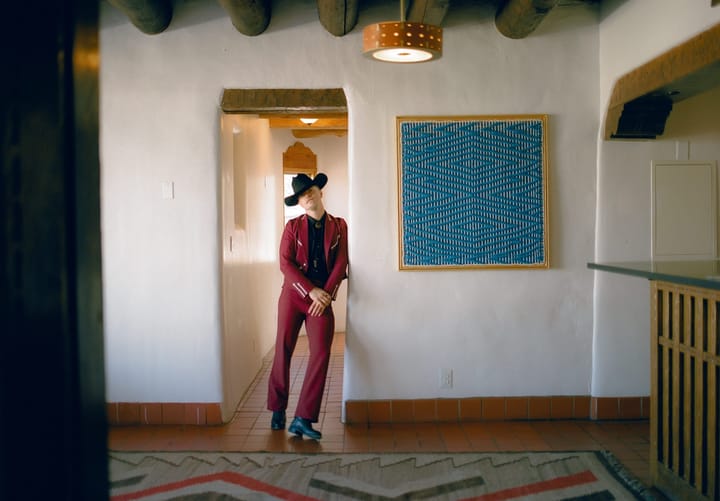When I was in Nashville a few years ago, I bought a ‘Capitol Years’ Linda Ronstadt compilation. It was four discs: Hand Sown...Home Grown (1969), Silk Purse (1970), Linda Ronstadt (1972), and Heart Like a Wheel (1974). I couldn’t pass up a package like that, knowing she was an integral part of the Laurel Canyon scene in the 60s and 70s, but not really knowing any of her work. For awhile, I listened to Hand Sown, and was particularly partial to her covers of Dylan’s “Baby You’ve Been On My Mind,” Fred Neil’s “The Dolphins,” and her version of “Silver Threads and Golden Needles” especially. But the album never really stuck with me, and after a few spins I put the whole package away. Stupid move, because the four albums are a rich miniature history of American country, folk, and pop music.
So I returned to it this week. It was a really hard album to get into after my fling with Yoakam’s Guitars, Cadillacs last week. I detoured over to Calexico’s Carried to Dust for a little break after the first listen to Ronstadt, and indulged with “House of Valparaiso,” a song I can’t get enough of these days.
I felt like I had cheated on a diet when I did that, so I returned to Silk Purse with renewed determination to stick with it for the week. I just couldn’t connect to the songs. Then suddenly it clicked. I think when you listen to something for a week solid (or longer), you end up either loving it or hating it. I don’t know if there’s any in between. So guess what...I love it.
Silk Purse, the album that featured the famous cover of Ronstadt sitting demurely in a pig pen is a veritable tribute to the great songwriters in American history. Ronstadt covers tunes from Mel Tillis, Goffin and King, and Gene Clark/Bernie Leadon, among others. It opens with a hopping rendition of “Lovesick Blues,” where she growls her way through the lyrics and then moves quickly to a song written by Mickey Newbury (is it true he was born Milton Slim Newbury?), “Are My Thoughts With You?” where her aching phrases are supplemented with sorrowful harmonica and a full chorus of backup singers.
One of my favourites on the album is the next song, a version of “Will You Love Me Tomorrow,” which was originally rejected by Johnny Mathis and taken to The Shirelles in 1960, becoming the first #1 hit by an all-girl group. Ronstadt reveals her pop side on this song, and producer Elliot Mazer takes a cue from the Wall of Sound era, filling out the song with busy percussion, thick background harmonies, and a full band. “Louise” takes a turn towards the introspective, displaying Ronstadt’s aptitude for subtlety. Here, she soars up to falsetto notes at the ends of phrases so gently, you don’t catch them if you’re not listening closely.
I was surprised to find out that “He Darked the Sun” was not a traditional spiritual, but in fact a tune composed by Byrds/Eagles/Dillard and Clark members Gene Clark and Bernie Leadon. There are two versions on the compilation, the slow-moving, acoustic guitar-driven original and the ‘Nashville,’ a sweet, fiddle and pedal steel duet that enhances the natural country hiccup in Ronstadt’s voice. Ronstadt’s country roots are further evident in “Life is Like a Mountain Railway” and in her cover of Mel Tillis’s “Mental Revenge,” on which the fiddle takes a squeaky lead role. Good for a breakup:
Well, I hope that the friend that you’ve thrown yourself on
Gets drunk and loses her job
And every road that you travel on
Is dusty, rocky, and hard
Of course, I can’t ignore the two ballads that perhaps represent the direction Ronstadt would go in future years, “I’m Leavin’ It All Up To You,” and “Long Long Time.” The latter got her a Grammy nomination. In the liner notes for the compilation, Barry Alfonso notes that Ronstadt was so tired after the second take of the song, she fell asleep in the control room. Little wonder, since she pushes her voice from a quiet, breathy realm to the yearning, unbreaking phrases of the song’s climax.
Overall, this album displays the maturity Ronstadt developed in the years after Hand Sown. The collection of songs is well-chosen for her voice and she is a master interpreter. The band, Nashville group Area Code 615, seems sharper than the players on her first album and Silk Purse works as a cohesive whole. Ronstadt went on to become a pop star, but Silk Purse is a testament to her country and folk roots, filtered through the sensibilities of a versatile band and extraordinarily talented singer. Ronstadt is the kind of singer, like k d lang or Dusty Springfield, who is so good, you think you can sound just like her with a little effort. I tried belting out some of the tunes along with her when I had a rare moment at home alone on the weekend. Then cat’s ears went sideways and my neighbours started banging on the floor, so I stopped.



![The Art of the Cover Song [ESSAY]](/content/images/size/w720/2026/01/DAVID-HUCKFELT--4--by-Graham-Tolbert-1.jpg)
Comments ()